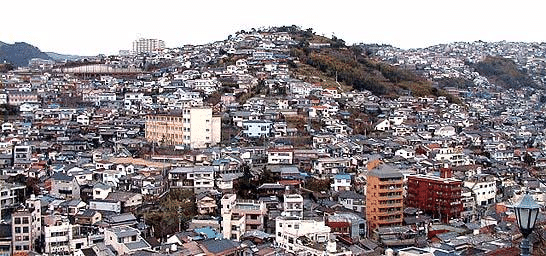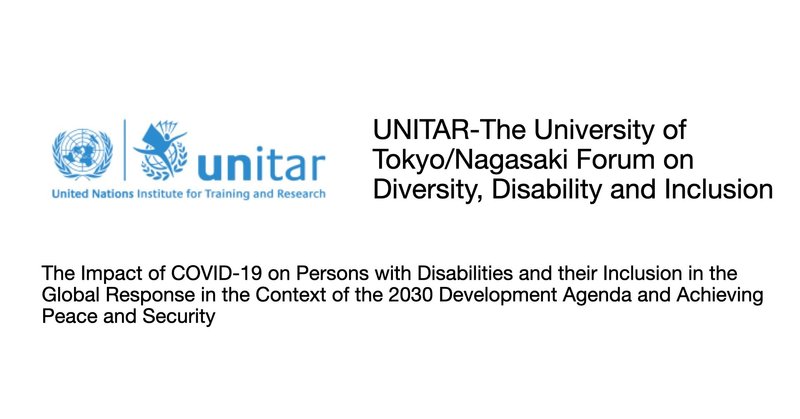
NAGASAKI INCLUSIVE VALUE.
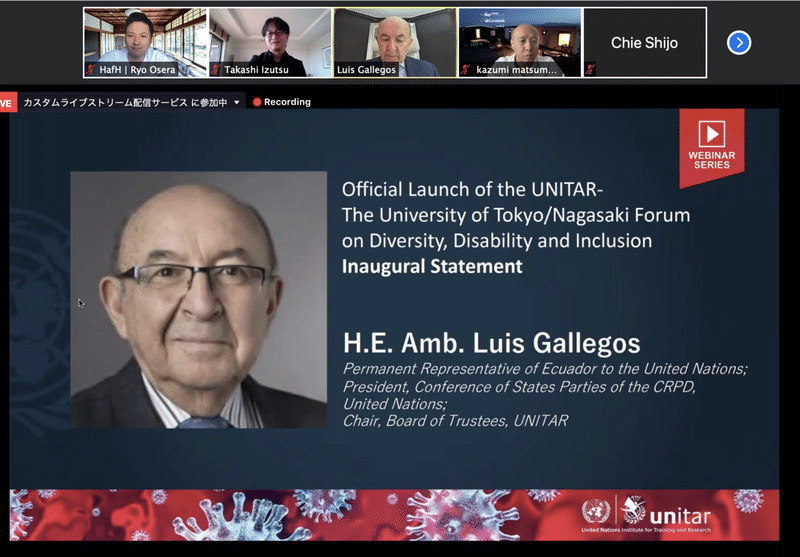
Addressed on 10th June, 2020 in UNITAR-The University of Tokyo/Nagasaki Forum on Diversity, Disability and Inclusion: The Impact of COVID-19 on Persons with Disabilities and their Inclusion in the Global Response in the Context of the 2030 Development Agenda and Achieving Peace and Security.
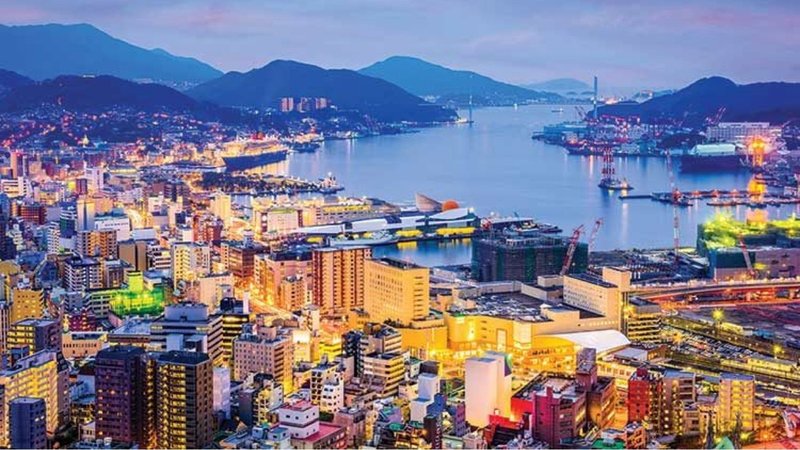
Nagasaki, my hometown, has its own unique history even within Japan. In short, it’s always had a history of acceptance.
This city was originally built by the Japanese government about 400 years ago as the only place in Japan open for foreign trade. Items, people, and information from across Europe and China arrived in Nagasaki first before spreading across Japan. Western and Chinese cultural influences were absorbed into local Japanese culture, and this mix of culture found its way into things like food and festivals.
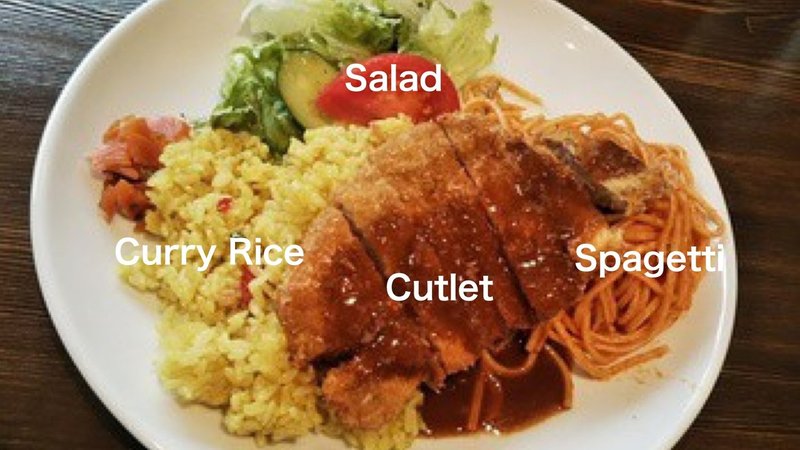
For example, there is a local dish in Nagasaki called Turkish Rice. What does Turkey have to do with Nagasaki? Well, it is said that the reason for this is that Turkish Rice is made up of a meat cutlet, spaghetti, curry, and fried rice - delicious foods from east and west combined on one plate, which is kind of like the trade center of Europe and Asia, Turkey. However, to be completely honest, no one in Nagasaki knows the actual reason for its name. In any case, please be sure to try our local dish and see if you can gain a sense of its origins.

Back in its heyday, Westernization was more prevalent in Nagasaki than anywhere else in Japan, which is what eventually also led it to become the target for the atomic bomb. Despite that sad day in history which saw about 200,000 people reduced to ashes in an instant, Nagasaki still continues to be a place of acceptance; a fact that is famous across Japan.
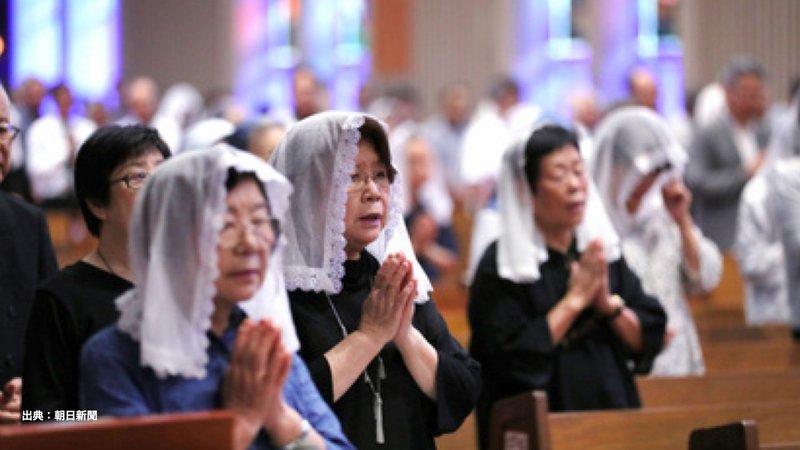
Perhaps it was the faith of the many Christians living in Nagasaki that allowed them to overcome this tragedy. It could also be that “acceptance” is deeply rooted in the hearts of the people of Nagasaki, where values of different cultures have long been accepted, even when those values were temporarily seen as those of the enemy.
We could say that the circumstances surrounding Nagasaki City during COVID-19 are also unique. No residents of Nagasaki City have been infected up to this point. There is no other place in Japan with a population of 400,000 or more that has recorded a 0 local infection figure.
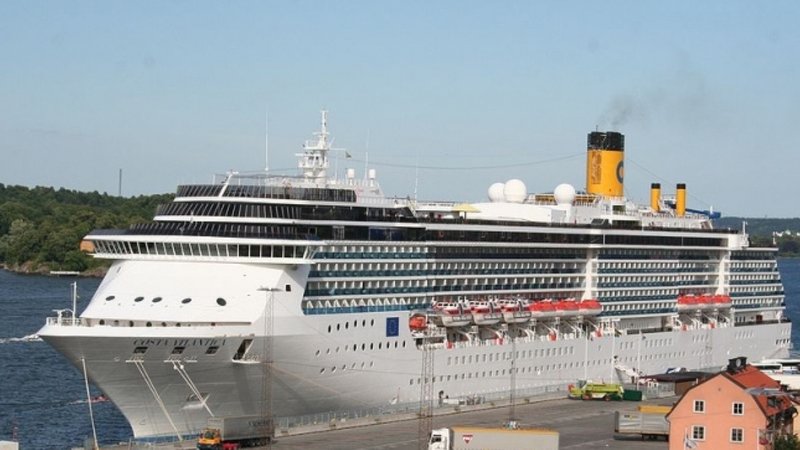
Another unique thing is that a huge foreign cruise ship that docked in Nagasaki ended up having a large cluster of nearly 150 COVID-positive persons. That was a huge shock for the people of Nagasaki, where there had been no cases up until then. There was a big concern that positive persons might fill up the hospital beds, fears of infection spreading to the local community also spread. The locals were in a panic, and one wrong move could have seen protests for the exclusion of these foreign nationals.
However, such a terrible affair didn’t occur in Nagasaki, the city of acceptance. As a result, almost all of the foreign patients were discharged safely and the cruise ship left Nagasaki last week without incident. Words of gratitude from those on board as the ship left the port / generated a sense of civic pride here in Nagasaki.
In other words, inclusiveness is a word that is very familiar to the city of Nagasaki and a value that comes naturally to us.
Through the history of trade, the history of the atomic bombing, and so on, I feel that this ability to accept and value things that are different from ourselves/ is a force that the world needs now more than ever.
We need to embrace diversity, including disability, nationality, ethnicity, sexual orientation, and religion. Now is the time to promote this concept of inclusivity to the world as Nagasaki Inclusive Value.
This city has the ability to take a leadership role in proposing the inclusion of diverse 21st century values as Nagasaki Inclusive Value to the world.
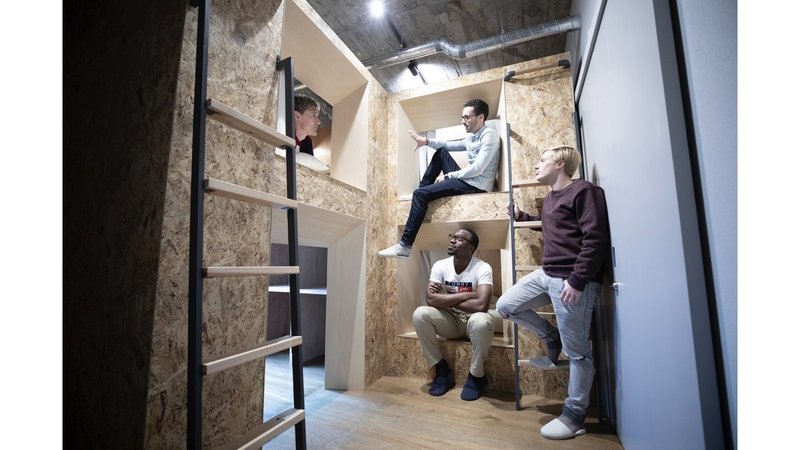
As a representative of a private company that was built and is headquartered in Nagasaki, I am committed to making these values our civic pride, and to run my business in a way that is worthy of being recognized by the world.
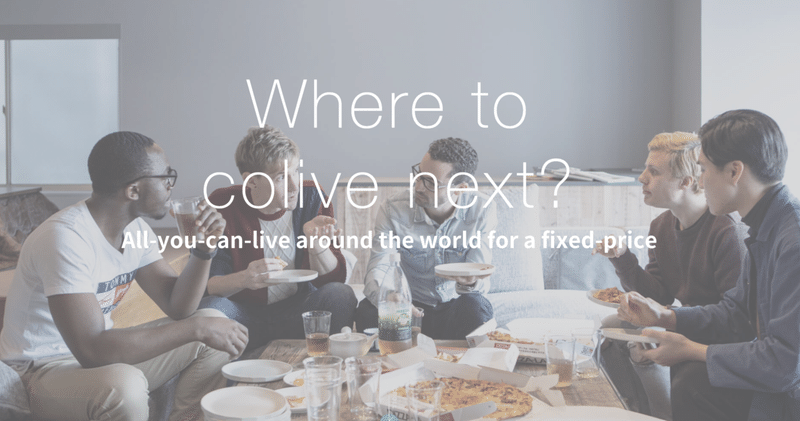
I started HafH in April of last year. HafH is an acronym for Home away from Home. We named our service in the hope that it will become a "Home away from Home" for all kinds of people, right across the world.
By signing up to our subscription service, one can stay as much as one wants, all over the world.I created this service and launched it from Nagasaki with the dream of a world /where you can work and live where you want, and with who you want. At present, members of HafH have access to facilities in 163 cities across 20 countries and regions, and this number is growing.
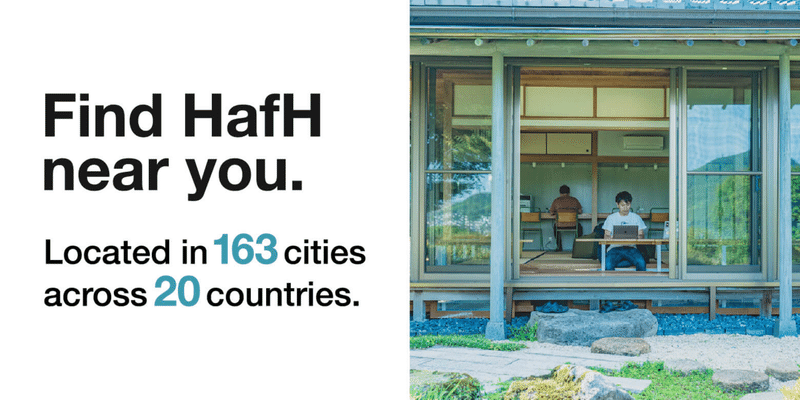
Oddly enough, COVID-19 has accelerated the world into an era in which people can work without having to be in the office, with the introduction of remote work in companies right across the globe.
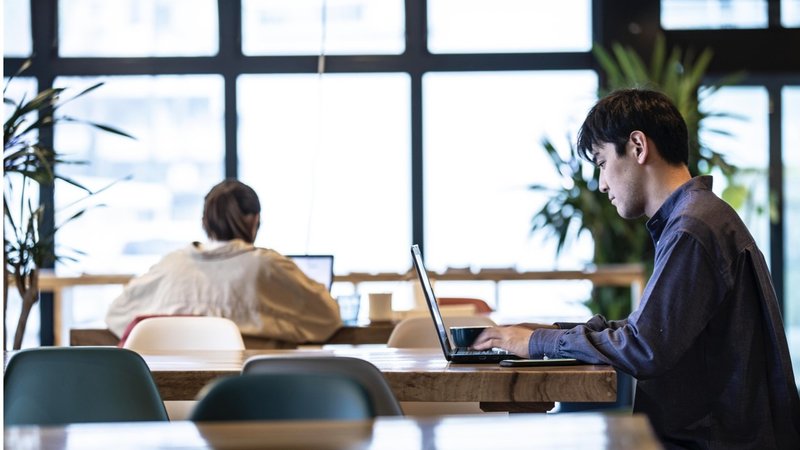
If people can make choices according to their own values, even make decisions like "I want to live near beaches" or "What location should I call home next?", then we can move forward towards a future / that is more inclusive of diverse values. We will continue to develop our service so that, regardless of circumstances, people will have more opportunities to choose a home by their own values.
Physical accessibility is still one of this city’s biggest challenges. First of all, the town is full of steep slopes, getting from one place to another is a sweaty business for all including persons with disabilities. Many homes and shops are in locations that are not serviced by public transportation, which places significant limitations on travel.
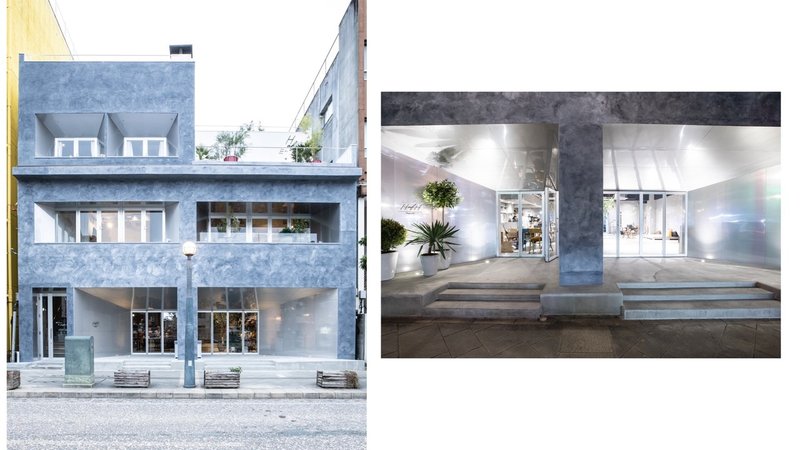
Even in our directly operated HafH facility here in Nagasaki, a refurbished 50 year old building, there is no elevator, so wheelchair users need support in going up stairs.
However, building upon Nagasaki’s history of inclusion, we are now reviewing all our facilities and services, and promoting accessibility through addressing environmental, institutional and attitudinal barriers. In the process, we are working together with various stakeholders including young people, persons with disabilities, older persons, in order to learn from various perspectives.
During this pandemic, wheelchair users have experienced more anxiety than persons without disabilities. Some persons with disabilities have said that they have needed to take more precautions because their faces are close to spots and places touched by the hands of persons without disabilities. Others made mention that it would be nice if there were more wet towels made available to wipe their hands after using their wheelchairs. For people with visual impairments, touch is information, so more support is wanted with helping to keep their hands clean as well. It’s quite common to hand out wet wipes for free in Japan, so by informing staff, we were able to put this practice in place immediately.
In conclusion, please let me introduce a Japanese famous poem by Misuzu Kaneko called “A bird, a bell and me” with a line in it that goes “all are different, all are good.” All Japanese people know this poem.
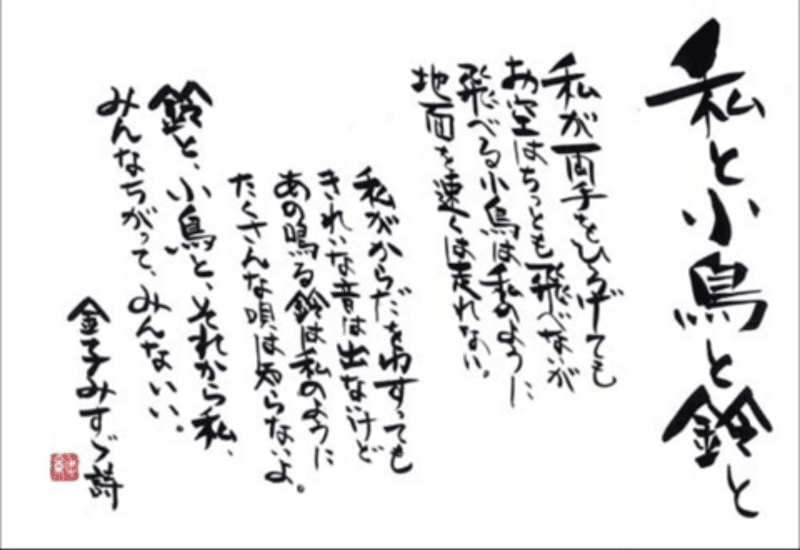
The poem reads,
“No matter how I spread my arms, I cannot fly like a bird. But unlike me, a flying bird cannot run fast on the ground. I cannot make a sound as beautiful as a bell, yet unlike me, a ringing bell does not know many songs.”
“There is yourself, and then/ there are people different to you, and both are important.”
This is the message of this 100 year old poem, whose words, even today, make you think.
The value of the word "inclusiveness" comes from knowing the differences between ourselves and others, and respecting the goodness of both. We need to know our own values, and listen to the values of others. By appreciating both, we can transform diversity into town values. We will strive to carry on the legacy of this town through Nagasaki Inclusive Value.
Thank you.
Ryo Osera, Co-founder of HafH, as well as KabuK Style Inc.
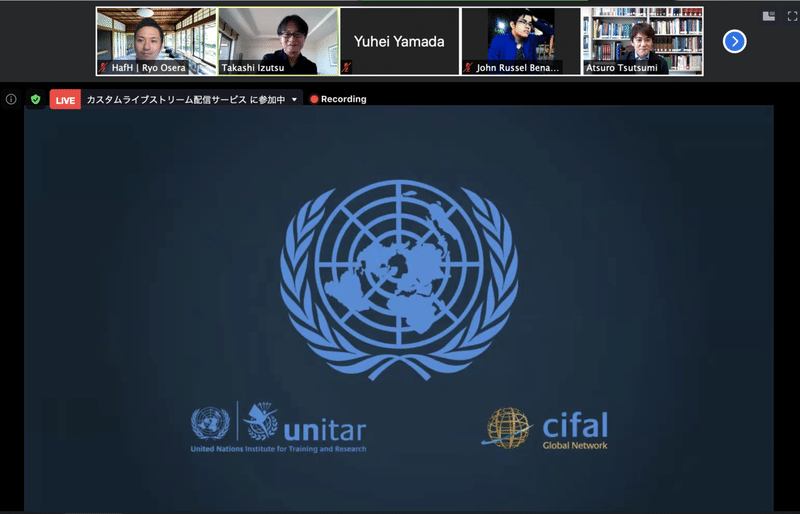
Cooperation for translation with Gärth Kakëru Kuraüchi.
Thank you for your support!

